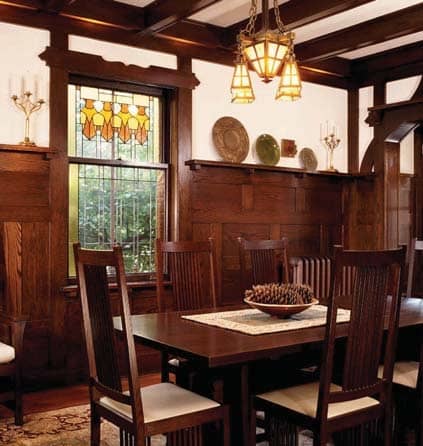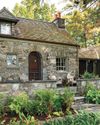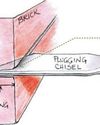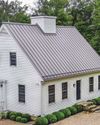
English-inspired houses are part of the same architectural movement that spawned the English Queen Anne Revival style, American Queen Anne houses, the Shingle Style, and Tudor Revival. All mark a transition between late-Victorian sensibility and the beginning of modern architecture—which includes houses of the Arts & Crafts movement. Earlier American Tudor houses could be academic, with flattened facades and no half-timbering. Arts & Crafts Tudor is more playful and includes such elements as over-scaled brackets and knee braces, decorative half-timbering, and pergolas. Despite steep roofs, these houses tend to be horizontal, whereas the suburban (e.g., “Stockbroker Tudor”) houses that followed often have vertical emphasis.
Tudor styles took hold here ca. 1905, concurrent with the American Arts & Crafts movement. Architects working in the Tudor and Arts & Crafts idioms were dipping from the same well. Many Craftsman houses and Tudor Revivals share the same old-world precedents, especially elements copied from the late-medieval and Tudor periods in England. Hallmarks of both residential styles include halftimbering and projecting bays, diamondpane windows, steep roofs covered with graduated slates or shingled “thatch,” and flattened Tudor arches. Inside, they share high oak wainscots, ceiling beams, important hearths, and inglenooks. In most cases, the style was a true revival, not pure in its mimicry. Late medieval details were mixed with finer Elizabethan conventions, just as elements might have been borrowed from both thatched cottages and stone manors.
Denne historien er fra May 2020-utgaven av Old House Journal.
Start din 7-dagers gratis prøveperiode på Magzter GOLD for å få tilgang til tusenvis av utvalgte premiumhistorier og 9000+ magasiner og aviser.
Allerede abonnent ? Logg på
Denne historien er fra May 2020-utgaven av Old House Journal.
Start din 7-dagers gratis prøveperiode på Magzter GOLD for å få tilgang til tusenvis av utvalgte premiumhistorier og 9000+ magasiner og aviser.
Allerede abonnent? Logg på

faded luxe IN A RETURN TO SAVANNAH
Residents of the Blue Ridge Mountains find their city home in a converted commercial building in beautiful Savannah, Georgia.

a hudson valley VERNACULAR
When Harlan Bratcher started looking for a country house in New York, in 1990, he knew what he wanted-something peaceful and serene, an escape from the hectic lifestyle of Manhattan.

the Dr. Mills house RESTORED
In rural Washington State, a dedicated couple bring back a 1912 bungalow that once had been the town's hospital.

The Right Masonry Tool for Repointing
The mortar between individual bricks or stones begins to erode after many years. That might be attributed to rain and wind, leaky gutters, building settlement, or such chemical agents as de-icing salts.

How To Remove Wallpaper
There's more than one way to do it; try them all until you find what works for your situation.

living with PLASTICS anxiety
Plastics are ubiquitous in modern life. Even houses built long before vinyl caught on are now full of polymer-based products, from the hoses in pull-down faucets to plastic light switches. Now that we know exposure to certain plastics can be hazardous to human health, we need guidance on how to evaluate building products for potential impacts.

homey Craftsman Textiles today
For bungalows, Craftsman houses, and Tudors that might have rather severe woodwork and furniture, textiles are a critical part of the decorative scheme.

Navigating the Lumberyard - Here's some lumber lingo you should know before you venture into a lumberyard.
Here's some lumber lingo you should know before you venture into a lumberyard. Almost everyone fixing an old house will end up at a lumberyard-whether it's a local supplier or the organized aisles of a big-box home-improvement store.

a farmhouse renewed
Sensitive renovations and restoration work preserved a house that dates to 1799.

AN OVERVIEW OF METAL ROOFING
METAL ROOFS ARE RESURGENT, FOR GOOD REASONS.